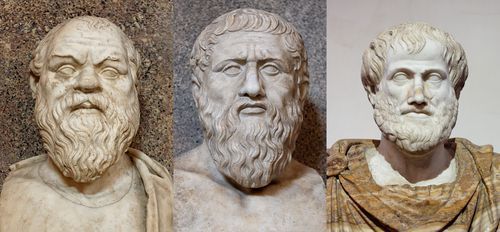How to Make Kids Hate Writing; A Personal Observation
I have thirty-five years of experience in secondary education. Teaching is a noble profession. Its main reward is intrinsic: the gratification of inspiring and encouraging children to love learning. There is, however, a traditional dead hand, something which can kill the love of learning quickly and perhaps forever: It is the ignoble and inane practice of assigning written work as punishment.

If you do this, what are you thinking? What are you teaching? Is it not the idea that writing should be avoided? Surely that is not teacher's intention, but it is absolutely what results.
Enthusiasm is all-important when teaching. It is our best tool, and it touches everyone in the classroom. Think of your best teachers. Did even one of them act as if they would rather be somewhere else or be doing something else? I doubt it.

Let's take three legendary teachers:
First Socrates.
Socrates was a great teacher because he taught students to question what they thought they knew and to think for themselves. He taught that honest inquiry was important.
His best student was another great teacher, but whereas Socrates asked questions, Plato lectured while walking in a grove. He spoke in a way that encouraged his students to look at what was in a new way.
His best student was another great teacher, perhaps the best the three. Aristotle taught his students to gather information, categorize it, hypothesize based on what the information suggested, and then test it by what amounts to the modern scientific method.
These three ancients differed greatly in their methodology, but they had one thing in common: they loved learning and they taught their students to love it. They encouraged thought. They did not concern themselves with punishments.
The simple truth is that rewards work better than punishments, and the best rewards are intrinsic. Learning is immensely gratifying. That is what our emphasis as teachers should be. Our love for learning should shine.
Can you imagine Socrates being upset at the behavior of Plato and telling him that for punishment he would have to consider three additional questions? Or Plato telling an erring student that he would have to walk and listen to him for an extra hour? Would Aristotle tell one that he had to collect an additional fifty items to classify?
Humans are learners. Their minds are built for pattern seeing and interpreting. Self-expression is our forte. Don't pollute the natural process by applying counter-conditioning to the marvelous mechanism that is hard-wired in each and every one of us. We are natural story tellers as well as learners.

Give your students the gift of your own enthusiasm. If you have none, please leave the profession—and don't let the door hit you on the way out.

If you do this, what are you thinking? What are you teaching? Is it not the idea that writing should be avoided? Surely that is not teacher's intention, but it is absolutely what results.
Enthusiasm is all-important when teaching. It is our best tool, and it touches everyone in the classroom. Think of your best teachers. Did even one of them act as if they would rather be somewhere else or be doing something else? I doubt it.

Let's take three legendary teachers:
First Socrates.
Socrates was a great teacher because he taught students to question what they thought they knew and to think for themselves. He taught that honest inquiry was important.
His best student was another great teacher, but whereas Socrates asked questions, Plato lectured while walking in a grove. He spoke in a way that encouraged his students to look at what was in a new way.
His best student was another great teacher, perhaps the best the three. Aristotle taught his students to gather information, categorize it, hypothesize based on what the information suggested, and then test it by what amounts to the modern scientific method.
These three ancients differed greatly in their methodology, but they had one thing in common: they loved learning and they taught their students to love it. They encouraged thought. They did not concern themselves with punishments.
The simple truth is that rewards work better than punishments, and the best rewards are intrinsic. Learning is immensely gratifying. That is what our emphasis as teachers should be. Our love for learning should shine.
Can you imagine Socrates being upset at the behavior of Plato and telling him that for punishment he would have to consider three additional questions? Or Plato telling an erring student that he would have to walk and listen to him for an extra hour? Would Aristotle tell one that he had to collect an additional fifty items to classify?
Humans are learners. Their minds are built for pattern seeing and interpreting. Self-expression is our forte. Don't pollute the natural process by applying counter-conditioning to the marvelous mechanism that is hard-wired in each and every one of us. We are natural story tellers as well as learners.

Give your students the gift of your own enthusiasm. If you have none, please leave the profession—and don't let the door hit you on the way out.
Published on March 04, 2019 08:44
•
Tags:
creativity, education, enthusiasm, learning, reading, reward, teaching, writing
No comments have been added yet.
Musings and Mutterings
Posts about my reading, my writing, and thoughts I want to share. Drop in. Hear me out. And set me straight.
- A.R. Simmons's profile
- 59 followers



